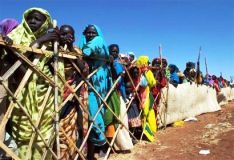Sudan govt, Darfur rebels agree on refugees’ right to return
ABUJA, Nigeria, Nov 10, 2004 (AP) — Sudan’s government and Darfur rebels Wednesday ended talks on the country’s bloodied Darfur region, with agreements on security and refugees but no pact on a long-term resolution to the bloodletting.

|
|
Displaced Sudanese women wait for food provided by the Saudi Relief Agency, to be distributed Tuesday, Nov. 9, 2004, in el-Sereif refugee camp, on the outskirts of Nyala town in Sudan’s western Darfur region.. (AP). |
A later round, expected in mid-December in the Nigerian capital of Abuja, would work on a political accord, delegates said.
Twenty-one months of violence in Darfur have left untold tens of thousands dead and driven 1.8 million refugees from their homes, international officials say.
Sudan’s Arab-dominated government and pro-government Arab tribal fighters are accused of launching coordinated attacks on non-Arab farmers after two non-Arab rebel groups rose up in February 2003. Sudan denies targeting civilians or allying with the so-called Janjaweed militia.
The talks ending Wednesday were the first of three rounds to reach even partial deals.
Sudan and the two main rebel groups signed two accords Tuesday, one promising aid organizations unfettered access to Darfur’s displaced and the other banning “hostile” military flights over Darfur.
The accords follow a widely flouted April cease-fire accord.
The government and rebels also agreed on a broad set of principles Wednesday, including “the inalienable right of refugees and internally displaced people to return to their places of origins,” chief mediator Allam-Mi Ahmad said.
Both sides agreed in principle, without signing, to eventual devolution of powers to Darfur’s three states and “effective representation” for Darfur’s people in the national government.
No political accord was signed because of disagreement over rebel demands, including the Sudan Liberation Army’s call for a secular state, delegate said.
The U.N.’s delegate at the talk, Abdul Mohammed, warned that the accords would mean nothing if not implemented.
“In Africa nearly all peace agreements fail because they are not implemented honestly,” Mohammed said. “This should be the No. 1 lesson … It is only in implementation that you earn trust, not in rhetoric.”
Justice and Equality Movement delegate Ahmed Tugod Lissan said he would believe the government once he sees proof on the ground.
“We state very clearly: there is a lack of confidence between us and the government,” Lissan said. “We hope the government of Sudan will take its responsibility
